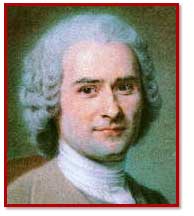 Jean-Jacques
Rousseau (1712-1778)
Jean-Jacques
Rousseau (1712-1778)
Switzerland/France
Jean Jacque Rousseau, one of the great philosophers
of the French enlightenment, was born in Geneva, Switzerland,
and raised by an aunt and uncle, after his mother died days after
his birth. At the age of thirteen he was apprenticed to an engraver,
but ran away three years later, eventually becoming the secretary
for Madame Louise de Warens, who influenced his life and writings.
In 1742, Rousseau went to Paris, where he became a friend of Denis
Diderot, a French philosopher and the writer of Encyclopedie,
the "bible" of the Enlightenment.
Rousseau was a creative writer and used everything from opera
to novels and romances to explain his philosophy. He believed
that human beings are inherently good, but are corrupted by the
evils of society. He considered science, art and social institutions
to be a part of what corrupts. He believed that the only way to
get back to that goodness that human beings are born with is to
be as close to nature as possible.
In The Social Contract, Rousseau explained his political theories,
which would later influence the writers of the United States Constitution
as well as the leaders of the French Revolution. "Man is
born free, and he is everywhere in chains." Because humans
are corrupted by society, all people must enter into a social
contract that requires people to recognize a collective "good
will," which represents the common good or public interest.
All citizens should participate and should be committed to the
good of all, even if it is not in their personal best interest.
He believed that living for the common good promotes liberty and
equality.
Rousseau was a big supporter of education. "We are born weak,
we need strength; helpless we need aid; foolish we need reason.
All that we lack at birth, all that we need when we come to man’s
estate, is the gift of education." His novel Emile emphasizes
how allowing free expression and a focus on the environment instead
of repressing curiosity will produce a well-balanced, freethinking
child. He also believed that women needed to be educated as well
as men, but in different directions. Women, according to Rousseau,
were not meant to be brought up ignorant and only allowed to do
housework. "Nature means them to think, to will, to love
cultivate their minds as well as their persons; she [Nature] puts
these weapons in their hands to make up for their lack of strength
and to enable them to direct the strength of men. They should
learn many things, but only such things as suitable." Rousseau
was not only remarkable because he believed that a child's education
should be focused on his/her interests, but also because he believed
that women need to learn more than simply domestic chores.
After years of moving from place to place because his ideas were
unpopular with government officials, Rousseau died in 1778 in
Ermenonville, France.
Classroom Discussion Questions:
If Rousseau were alive today, how would he answer the question, "Which is more powerful, love or hate?"
In a historical context, what would Rousseau think was the greatest
challenge facing humankind during his lifetime?
According to Rousseau, what is the root cause of greed?
Rousseau believed that science, art, and social institutions corrupted
human beings from their natural goodness. What modern examples
do you think he would have been the most against?
To learn more about Jean Jacques Rousseau,
follow these links:
http://www.wabash.edu/Rousseau/
http://www.utm.edu/research/iep/r/rousseau.htm
http://www.lucidcafe.com/library/96jun/rousseau.html
http://www.knuten.liu.se/~bjoch509/philosophers/rou.html
http://www.infed.org/thinkers/et-rous.htm
http://oregonstate.edu/instruct/phl302/philosophers/rousseau.html
http://www.philosophypages.com/ph/rous.htm
http://www.trincoll.edu/depts/phil/philo/phils/rousseau.html
TO LEARN ABOUT OUR OTHER "PHILOSOPHERS OF THE WEEK" CLICK ON ONE OF THE LINKS BELOW.
• Dewey • Socrates • Plato • Confucius • Rand• Locke • Camus • Cavendish • Sartre • Rousseau • King• Descartes • Spinoza • de Beauvoir • Nietzsche • Kant • Hypatia • Thoreau •

